For quite some time, Kishan Gangolli has been one of the leading visually challenged chess players in India. Having already won the AICF-B National ‘A’ four times on the trot, Kishan took things to the next level by scoring a thumping victory at the IBCA Asian Chess Championship for Visually Challenged a couple of months back. Post his success, we caught up with him to know more about his victory, his journey so far, the state of visually challenged chess in India and his personal ambitions for the future.
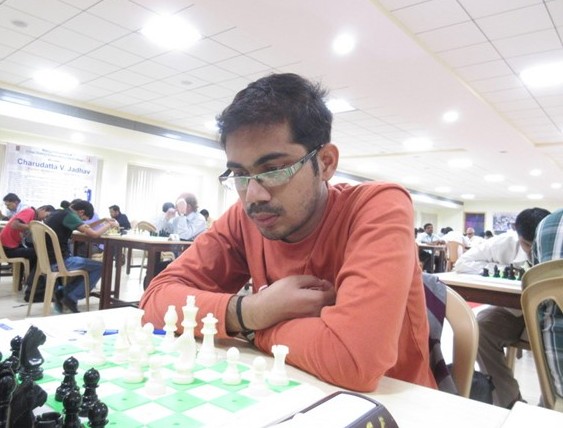
Shubham Kumthekar: Congratulations on your fantastic victory! What were your expectations going into the tournament?
Kishan Gangolli: Thank you so much! Initially, the entries were much higher than what the eventual response turned out to be. Strong players from 7-8 countries were expected to participate. However, only four countries turned up for the event. As such, I began as the second-seeded player, yet was aware of the challenge that lay ahead. The situation improved round by round…
At what point did you feel that the victory was in your court?
I played against the Bangladeshi player Husain Ejaz, the top seed of the event, in the fourth round of the tournament. It was always going to be a crucial match. My train of thought was as follows: If I lose to him, my chances of securing a medal may very well disappear. As such, I was planning to hold him to at least a draw. However, in that case, there would have been no one practically to stop him, allowing him a free run to the title. As a result, I decided upon taking a chance, played a double-edged game, and finally won!

How do you feel about the victory?
It’s a nice victory, I feel proud – more so considering that the tournament was held in my home district of Udupi.
What kind of training did you undergo prior to the tournament?
The National A was held just prior to the Asian. As a result, I barely had any time to prepare specifically for the latter. However, the National, in itself, helped a good deal – most of the players who competed in the National also participated in the Asian. That made me feel pretty confident and I played an aggressive brand of chess at the Asian.
You have now won the AICF-B National Championship for four years on the trot. What has been your secret? 🙂
(Laughs) I work hard on my game, probably that is it 🙂
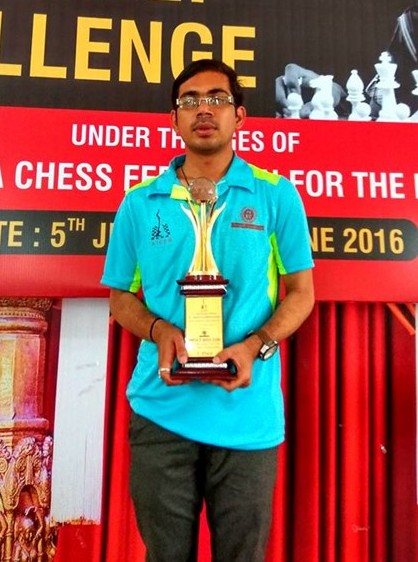
Can you take us through your journey in chess so far?
When I was in the 6th grade, my uncle, who was very interested in chess, took me to the Nalanda Chess Academy. Sri Krishna Udupa was the coach-in-charge over there.
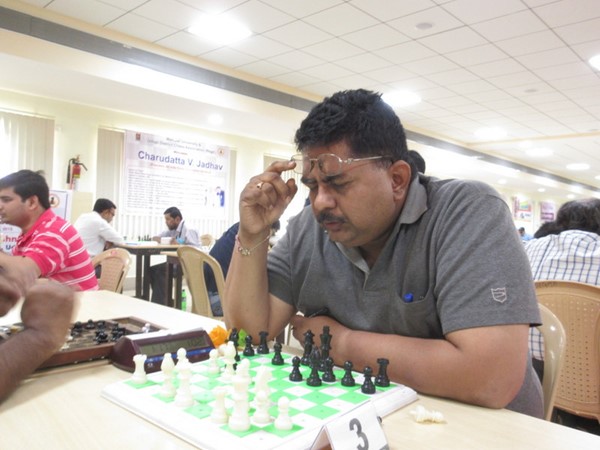
Initially, I found playing on the normal boards very difficult. With 25% vision, I would miss pieces on the normal boards. I felt uncomfortable playing on them. I thought I may not be fit for chess.
Nevertheless, I secured a rating of about 1850 in 2007 under the tutelage of Sri Krishna Udupa. Roundabout this time, I started working on chess on my own. It was only in 2011 that I came to know about Blind chess and started participating in those events. That year, I played my first National A for the visually challenged. This was followed by my participation in the World Juniors for the visually challenged where I stood 6th.
In 2011, I also qualified for the national school games, which is a team event. Interestingly, despite being the lowest-rated player in the team, I was appointed the team captain! I secured a board prize, with the Karnataka team securing an overall silver medal. We repeated our success the following year.
I often practice with IM Stany GA, who stays only 10 minutes away from my home. Depending on Stany’s availability, we work for 3-4 hours a day. We set up critical positions, try and analyze them in depth, and in some cases, play the positions out.
When I am practicing on my own, I often use a screen reader called NVDA. It reads out ChessBase games, PDF files, e-books, etc.
What has been the biggest moment of your chess career so far?
In 2012, the IBCA Olympiad took place in Chennai. Representing the Indian team, I scored 7.5/9 and secured the gold medal on Board Three. The Indian team finished a respectable 5th, the first time that we managed such a high position. This undoubtedly has to be the best moment of my career so far.
Who are some of your most challenging opponents?
There are plenty of players around (in the visually challenged circuit) who are moderately rated but are quite strong. Darpan Inani and Ashvin Makwana are two such players, but yes, they are not the only ones.
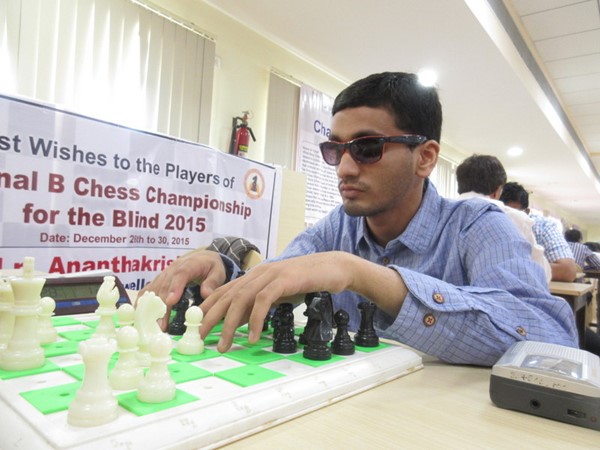
AICF-B has been doing a wonderful job for the welfare of visually challenged. Can you outline the activities of AICF-B and the support it lends?
Mr. Charudatta Jadhav, the president of AICF-B, has been putting all his efforts to improve the state of blind chess in India. He is our backbone – the man who has been working relentlessly to provide us with opportunities.

When I entered the blind chess arena, we were trained by Visweswaran to facilitate our preparation for the World Juniors 2011. From the next year, IM Shekhar Sahu took over the reins and began coaching us. He is our official coach to this day.
However, it’s not only about coaching. Charu himself develops software and books in Daisy & related audio formats for the visually challenged players. The Daisy audio format facilitates going through an audio file chapter by chapter, allowing to skip over to other chapters if required.
What are the biggest challenges pertaining to the development of visually challenged players in India?
First and foremost, it’s the lack of strong tournaments. The need for an accompanying person only adds to the problem.
Secondly, the financial challenges. Most of us come from a modest background and as such, only few can play tournaments, especially the strong ones, without bother.
Thirdly, the Government of India is not quite helping our cause – Blind Chess is yet to be recognized in India. For instance, they recently felicitated Shekhar Naik, the former blind cricket captain of India. However, nothing similar has been done for the cause of blind chess.
Let’s take another recent incidence, for instance. After my victory at the Asians, I applied to the youth service claiming a cash award. The response from their side was shocking. According to them, Blind Chess is not in the list of games and hence, they could not process my application any further. They added that Chess is not an Olympic game – it cannot be included in the Paralympic committee. In retaliation, I did submit a letter authorized by the AICF. However, it remains to be seen whether they process it or not.
Despite all this, AICF-B, and especially Charu sir, have been supporting us in whichever way feasible. Recently, he wrote a letter to the PMO before our Asian and indeed, we (the Indian contingent) received a message from the PMO wishing us luck. However, there was no mention of any assistance.
The good part right now is that our expenses for official events are being covered pretty well. When I played the World Juniors in 2011, only our flight expenses were covered. Since 2013, the Central Government has been covering our expenses. Yet, it’s the recognition that we long for.
Apart from all this, the basic issue of being unable to prepare as effectively and quickly as the sighted players is definitely a challenge.
Which countries are currently leading with respect to visually impaired chess? What sets them apart or what do those players or countries do differently?
Currently, Russia is the strongest country with respect to blind chess – they boast of a good number of International Masters.
Meanwhile, there is a certain player from Poland – rated about 2600 – who will be making his debut in the blind chess arena very soon. If he plays the Olympiad in June, then it will be his first blind event. Apart from this, I don’t have much information on him.
Besides, IM Daniel Pulvett from Venezuela, who is rated reasonably above 2400 is a notable visually challenged player.
Talking about facilities, I do not know much. I can think of the Spanish blind chess team being coached by Anand a few years back. Also, blind players from countries like Germany (where the IBCA has its headquarters) and Russia may have good support. However, this is only a guess.
What technologies do you think can make it easier for app developers like us to help visually challenged players?
In general, most blind players use Android phones. Quite often, I hear complaints along the lines that they are unable to play chess games on their phones. For us visually challenged players to play on cell phones, we need to use Talkback, a screen reader. Now, there are many apps for sighted players to play games on their phone. But these apps are not Talkback friendly.
When it comes to following live games, I use Follow Chess. It’s great that it announces the move on touching it. However, we are unable to gauge the placement of the pieces by touching the board as no such announcement is made with regards to the piece placement. This makes it difficult for the visually challenged players to keep track of the happenings on the board.
In both cases, the partially blind players can do by a bit. However, the fully blind players are the ones who find it cumbersome – it’s almost impossible for them to use many of the existing apps and thus, they miss out on chances to practice or study the games on the move.
What are your ambitions for the future?
I have a couple of key chess targets. Firstly, my aim is to become an International Master. Secondly, I am targeting the 2019 World Championships for the visually challenged.
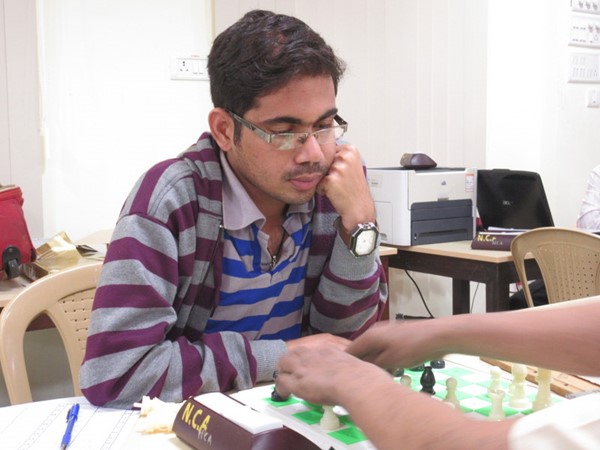
With respect to my academics, I have completed my Masters in Economics, wherein I ranked second in the university. Recently, I also passed the state eligibility test for lectureship.
In the long run, I am contemplating to take up chess as a profession. However, I need to see how it works out. I plan to play many tournaments in the forthcoming months. In May, I will be playing at Bhubaneshwar (Ed – Kishan is currently playing this event), followed by the IBCA Olympiad in June.
In the tournaments for visually challenged players, boosting one’s rating is a tough task. As such, I would love playing a good number of GM tournaments – I have played only one so far. I would particularly like playing the Spanish and Czech circuits. But again, securing sponsorship is a major challenge.
What will you like to tell our readers?
Chess is the only sport where the blind and the sighted can play on level terms without any real change in rules. The only major exception might be the ‘touch and move’ rule, as the visually challenged play with the ‘lift and move’ rule. Thus, we can see that chess caters to a large group of people. This makes our royal game truly special.
Blitzkrieg
Favourite food
I like sweet dishes, especially Kheer.
Favourite pastime
I love listening to music, Hindi songs in particular. Sonu Nigam is my favorite artist.
Early bird or Night owl
Early bird. I sleep by 11:30!
One motivational quote that gets you going.
There are many motivational quotes by Swami Vivekananda. If I had to name one, it has to be this: Strength is life, Weakness is death. Whatever you think, that you will be. If you think yourself weak, weak you will be; If you think yourself strong; strong you will be.
A big thanks to Priyadarshan Banjan of Chessbase India for all the wonderful pictures.